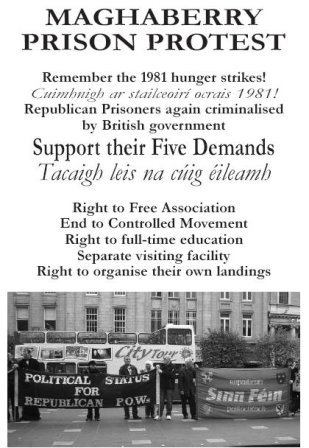In contrasto con quanto accaduto con l'introduzione dell'internamento nel 1971, la normativa emanata da nel giugno di quest'anno, che prevede l'estensione della detenzione finoa 42 giorni, è stata salutata con totale silenzio in Irlanda. Secondo questa norma, chiunque può essere detenuto nel regno britannico fino a 42 giorni, senza prove e senza accuse formali.
Numerose proteste avranno luogo in varie città dello Stato, tra cui quella che si terrà dinnanzi all'ambasciata britannica di Dublino il 9 agosto.
Protest against Internment in 2008 (éirígí)
éirígí is to publicly mark the 37th anniversary of the introduction of internment in the Six Counties by highlighting the reality of de-facto internment in the Ireland of 2008.
Protests will take place at a number of locations across the country, including the British Embassy in Dublin on August 9.
Before examining the current day situation, it may be helpful to first look back to August 9 1971. For it was on that day, at the break of dawn, that the British army and RUC smashed through the front doors of hundreds of working class nationalist and republican homes across the occupied Six Counties.
At first, many assumed that the raids were simply part of the ongoing campaign of terror that was at that time being waged by the forces of the British occupation. It wasn’t until later in the day that it became apparent that Brian Faulkner’s government in Stormont had introduced internment for the first time in more than a decade.
Within hours, many of the more than three hundred who were arrested that morning were on their way to the Long Kesh internment camp outside Belfast. For some, their detention would last days, but, for others, it would be months or even years before they would be released.
Reaction to the introduction of internment was as intense as it was widespread. All across the Six County state, mass protests and rioting broke out. The cycle of events that internment triggered included a widespread campaign of civil disobedience, Bloody Sunday in Derry and the subsequent burning of the British Embassy in Dublin, a massive surge in support for the IRA’s armed campaign and, ultimately, the creation of the prison struggle, which culminated in the Hunger Strike of 1981.
Such was the national and international outrage at the policy of indefinite imprisonment without trial that the British government soon moved to phase out its use. In its place, a ‘conveyer-belt’ system of injustice which, at least, had the appearance of justice, would be constructed.
By the time internment was ended in December 1975, the system of non-jury, single judge, Diplock courts was in place, which provided the British government with an effective, but less controversial, mechanism for the detention of those who sought to end its rule in Ireland.
In stark contrast to the introduction of internment in 1971, the introduction of 42-day detention legislation by the British government in June of this year has been greeted with near complete silence in Ireland. Under this legislation, anyone can be detained by the British state for up to 42 days, without charge and without trial.
Using the much-hyped threat of ‘global-terrorism’, Gordon Brown’s government has, with the swipe of a pen, eroded centuries of struggle for the most basic of human rights, including the right to individual freedom and the right to a fair trial. No one should be so naive as to believe that legislation nominally introduced to counter ‘Islamic fundamentalists’ and will not also be used against Irish republicans and any other dissenters that threaten the status quo.
Those in Ireland who have paid little attention to this latest step on the road to a British police state would do well to remember that roughly a third of Ireland’s population remains under the jurisdiction of that same state. The reaction of the vast majority of politicians in the Six Counties to this breathtaking erosion of the most fundamental of human rights has been strangely muted.
Those in the Twenty-Six County state, in particular, would do well to watch closely what is going on in British occupied Ireland and elsewhere, given the Dublin establishment’s propensity to ape the actions of their masters. In the southern state, the so-called special criminal court is increasingly being used for non-political offences. Legislation, initially introduced as an ‘emergency’ measure to protect the very existence of the state, is now being used against gangsters. Thus, the precedent of ‘emergency’ legislation being used for ‘non-emergencies’ has been established.
That same court has, in recent years and amid little publicity, been delivering its own form of detention without trial, through the use of highly questionable ‘membership of an illegal organisation’ legislation. This legislation, when combined with the removal of the right to silence without prejudice, can lead to jail sentences of up to seven years, with the only ‘evidence’ necessary being that of the word of a senior Garda.
Throughout the rich world, the events of September 11, 2001 in New York have been used to steamroll over every form of human right.
In the United States, the legislation establishing the Department of Homeland Security makes the world of George Orwell’s 1984 look like a progressive society. ‘Extraordinary rendition’, or kidnapping as it used to be known, and interment camps such as Guantanamo Bay have succeeded in lowering the bar of acceptability of government violations of human rights. Once again, it has fallen to ordinary citizens to ensure that those rights are upheld by governments.
On August 9 2008, éirígí will be holding a number of events across the country to highlight the reality of internment in modern day Ireland. Those who are concerned with the erosion of the human rights identified above should use the opportunity to come along and publicly register their opposition.
The Dublin city demonstration will take place outside the British Embassy, Merrion Road, Dublin 4 at 3pm on August 9.














